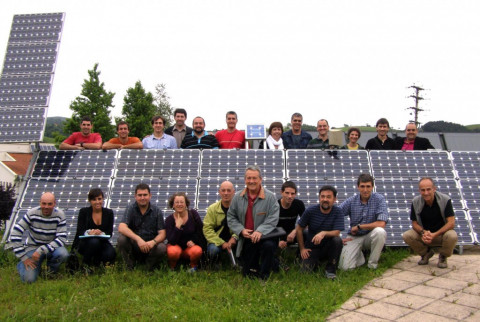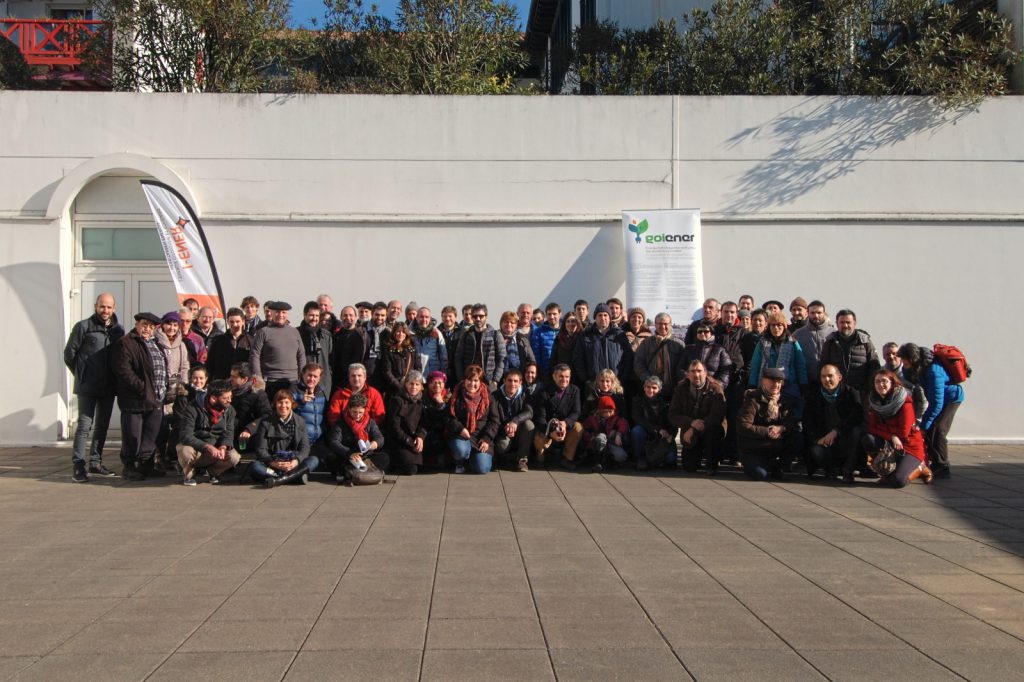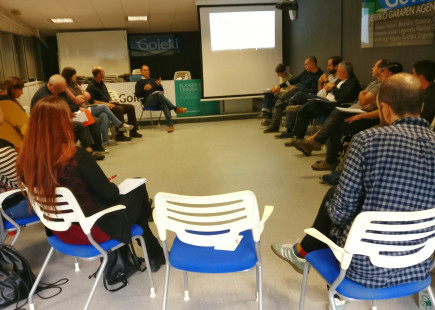A renewable energy model based on participation, collective ownership and gender equity GoiEner Cooperative, Basque Country
Topics
Regions
The GoiEner Cooperative was founded in 2012 in the Basque Country as a response to both the energy oligopoly and the rise of the anti-austerity movement connected to the economic crisis. Over the past six years, this cooperative for renewable energy generation and consumption has grown to include nearly 9,000 members, and has become an inspiring model for the transition to a new energy model.
Key attributes of GoiEner's approach include the alleviation of energy poverty, democratic and participatory involvement, and equal representation of men and women. GoiEner also supports the creation of new renewables cooperatives in other regions of Spain in order to increase local, democratic and renewable energy resilience.

GoiEner cooperative, Basque County
Background
The Spanish electricity sector has undergone major changes since 1997, when the government of José María Aznar adopted a decision to liberalise the sector. This catalysed the opening up of the retail and generation electricity markets, while transmission (high voltage lines, operated by Red Eléctrica de España) and distribution (medium and low voltage lines, in the hands of distribution companies) continued to be regulated. Five electricity companies currently control the electricity market in the Spanish state: Endesa, Iberdrola, Naturgy (formerly Gas Natural Fenosa), EDP Spain and Viesgo (which was part of E.ON between 2008 and 2015 and was recently acquired by Repsol). According to the Spanish TV show Salvados, these companies "control 80 per cent of the generation and almost 90 per cent of the sale. Both in the generation and in the sale, they have managed to expel the competition." Taking the above mentioned data into account, it would be accurate to say that we are dealing with an oligopoly.
The current system is a reflection of measures taken by the previous Popular Party Government (which was in power from 21 December 2011 until 1 June 2018). This government was opposed to energy self-consumption, which is the consumption of renewably-sourced electricity produced by citizens.
The new Spanish Socialist Workers' Party (PSOE) government, which has been in power since June 2018, has stated that it is in favour of encouraging self-consumption. This indicates that the new socialist government will make significant changes to the Spanish energy sector. However, the extent to which the economy will undergo an ecological transition is still unknown.
About GoiEner
GoiEner S. Coop. was set up in 2012, in reaction to both the energy oligopoly and the rise of the anti-austerity movement stemming from the economic crisis. The company has become an active part of the Spanish movement for a new energy model.
In the words of GoiEner, "energy, and particularly electricity, has now become a basic asset of our society, almost as basic as food or water. GoiEner wants citizens to regain control over this type of basic good and become aware of its importance, promoting a responsible and sustainable consumption of energy." GoiEner’s goal is to recover energy sovereignty for citizens by penetrating the currently liberalised parts of the electricity sector: retail (the purchasing of energy) and energy generation.
The cooperative started with 32 founding members in 2012, and by the summer of 2018 counted 8,916 members and 11,057 contracts. According to GoiEner, "the overall objective is to attract more and more citizens, companies, [and] entities in the field of the social and environmental economy and public entities". To reach this objective, the cooperative's first aim is to involve citizens in renewable energy generation and consumption in a participatory and democratic way. It functions as a non-profit cooperative, and strengthens the local economy by employing people from the region, distributing tax payments locally, and buying local goods and services.
In addition to these goals, GoiEner is supporting the creation of new renewables cooperatives elsewhere in Spain in order to increase local, democratic, and renewable energy resilience in other regions. To date, the following cooperatives have been created: Solabria in Cantabria, Nosa Enerxía in Galicia, Megara in Soria, Econactiva in Guadalajara and La Corriente in Madrid.
According to the cooperative, "GoiEner is a plural organisation, open to the participation of all social and political forces that want to collaborate in favour of an alternative to the current energy sector model." It is headquartered in Ordizia, with offices in Bilbo (Bilbao), Donostia (San Sebastian), Gasteiz and Iruñea (Pamplona). It also has an information point in Bera.
GoiEner is also a member of REScoop.eu, a federation of 1,500 European renewables cooperatives that brings together more than one million citizens involved in renewable energy, energy efficiency and responsible consumption initiatives. In 2017, it was a co-founder of Unión Renovables, the Spanish national federation of renewable cooperatives, which currently has 17 members and two part-time staff. This federation, which represents over 75,000 citizens, lobbies the national energy ministry, and members help each other to adapt to regulatory changes.

Members and building social capital
Since October 2013, GoiEner members have received electricity through the retail arm of the cooperative at home, at work and in other institutions at a rate similar to market rates. The process for becoming a member is simple: registration is processed through an online form, and a single payment of €100 is charged as a contribution to the cooperative's collective capital.
If a member decides to leave GoiEner, this contribution is paid back at the value of the share at the time of withdrawal. There is no territorial restriction to becoming a member, and GoiEner can work legally in all of Spain with the exception of the Canary and Balearic islands. However, the majority of members are from the Basque Autonomous Community and bordering Navarre. Interested individuals from further away are encouraged to link up with local and regional cooperatives or to join forces to create another cooperative.
The GoiEner cooperative operates on the principle of 'one member, one vote'. It is mandated to hold regular Governing Council meetings and at least one General Assembly per year, as well as frequent informational meetings open to the general public that rotate between the main cities. From the start, four voluntary working groups have focused on the following topics: renewable energy generation, retail, communications and administration. The cooperative hired its first employee in 2013.
GoiEner continued to grow throughout 2014, and attempted to respond not only to the needs of the retail cooperative, but also to request for action on the social, environmental and participation fronts. Members drew attention to the fact that the legal and economic structure of the retail cooperative was not sufficient for the implementation of GoiEner’s holistic social and participatory vision. Hence, the volunteer-based GoiEner Elkartea association was created in 2015 in order to boost the social objectives of the GoiEner S. Coop. retail cooperative. Since then, the GoiEner Elkartea association has acted strategically to promote the generation of renewable energy, achieve e-mobility, boost the local currency, explore the application of blockchain technology to energy markets, and tackle energy poverty.
Thanks to GoiEner Elkartea, the distribution of work has evolved into a methodology for GoiEner. The four initial working groups grew into eight major working groups (focusing on administration, internal processes, retail, communication, IT, generation, innovation and social impact), and these were in turn sub-divided into several smaller working groups. By the end of 2018, around 30 working groups in mixed configurations – including 26 staff members and 159 volunteers – had been created.
The association also carries out awareness and training activities aimed at the public, educational, economic and social agents, public administrators, and so forth. It also promotes studies and research that contribute to the objectives of the collective and stimulates the development of agreements and networking with other entities, such as municipalities, universities and other cooperatives.
Renewable generation projects
To date, one of the main fruits of the GoiEner Elkartea association has been the launch of a generation project called SorkWhtza (related to the Basque word "Sorkuntza", which means generation). This project allows citizens to invest in local renewable projects that are managed in accordance with GoiEner's social and participatory principles. The Spanish electricity sector law (Law 24/2013) prohibits a company or cooperative from carrying out both retail and generation operations, so a new structure was required in order to start up SorkWhtza. In line with GoiEner's policy to strengthen the local economy, and given the existence of hundreds of GoiEner members and several volunteers in Navarre, it made sense to create the new generation cooperative there. This cooperative, called Nafarkoop, took on one employee in 2017 and since April of 2018 has collected investments totalling €750,000 for three different projects: two hydro in Gipuzkoa and one photovoltaic in northern Basque Country (in collaboration with I-Ener, a local renewable energy company).
Fighting energy poverty
From the outset, one of GoiEner Elkartea's working groups has sought to find the most effective way to fight against energy poverty. The team has provided numerous "electricity bill workshops" around the Basque Country in order to help people to understand and reduce their electricity costs. This can be achieved in three ways: first, by reducing the maximum amount of power that can be consumed at any given moment at home, resulting in lower bills that still fully meet people’s needs. Second, by switching to a differentiated tariff in which the energy consumed at night and in the morning is 50 per cent cheaper than during the rest of the day. Third, by removing redundant services from the bill, such as the maintenance of the distribution network that private companies are legally obliged to pay for. As GoiEner’s retail work has expanded and various municipalities have joined the cooperative, relationships have spread from the energy field into the social sector. In this regard, relations with the municipalities of Zarautz and Usurbil are particularly noteworthy. Over time it became clear that the “electricity bill workshops” were not effective, as people did not follow the technical recommendations to modify their use or reduce their energy bills. As a result, the GoiEner Social Project was developed.
The 2018 Members’ Assembly agreed to support the GoiEner Social Project, which is being developed as a pilot project in Zarautz and Usurbil. This project bundles all of the experience accumulated so far and offers effective tools for social services administrators and municipal officers in their work with people facing energy poverty. The project also seeks to address the issues faced by socially excluded people and those in charge of care work.
Gender equity and making women visible
Since its inception, GoiEner has aimed for equal representation of men and women in the project, as well as gender equitable language and balanced participation in its working groups. Women are currently present in all of the decision-making spaces of the energy retail cooperative, the GoiEner Elkartea association and the SorkWhtza generation project, and their labour and contribution are considered essential and enriching. With regard to employment, up to 70 per cent of staff are women, meaning that they are involved in many day-to-day decisions. In addition, women have volunteered to speak at the workshops organised by GoiEner in different towns. The example set by these women has been remarkable, giving women overall much more visibility than what is usual in the patriarchal mainstream energy sector.
Mobilisation and participation
The most successful mobilisation tools for GoiEner have been presentations and word of mouth. From the early days, members have given over 100 presentations per year informing local people about the cooperative. These talks are usually the last push needed for people to decide to become members. Although social networks and the internet have also been used, face-to-face promotion has been the most effective. In the initial phase, when the economic crisis was at its peak, many people identified with and adopted the GoiEner project's dream as their own. Later, after the accumulation of a year's worth of experience, people decided to join in after hearing from members that they were satisfied. The opening of several offices throughout the Basque Country has contributed to the feeling of being close to people, and this proximity and local presence are hallmarks of GoiEner's success.
The GoiEner Group, which is the aggregation of the retail and generation cooperatives as well as the association, has developed its own methodology for governance based on sociocracy. The main objectives of this methodology are to encourage teamwork and co-responsibility. Measures against the concentration of power have been adopted, as well as a differentiated decision-making model through a body called the "pilotage". Any internal decisions made in the pilotage have been proposed and supported by working groups formed by volunteers and workers, which increases autonomy, participation and collective ownership of decisions. Moreover, the proposals that are brought to the General Assembly have largely been originated, designed and developed in the working groups and approved by the pilotage body. After a proposal has been passed in the General Assembly, it is implemented by the groups.
Workers and volunteers
Workers have the same influence as any other members of GoiEner's working groups. Control by the workers is limited, particularly since there are more volunteers than workers in the pilotage body. Although workers carry the main burden of the workload, they seek the support of volunteers and vice-versa. Workers and volunteers take equal part in the co-responsible and differentiated decision-making processes, which together form the engine of the GoiEner Group.
The GoiEner working groups are autonomous, but not independent. They are autonomous because they can develop any idea that comes out of the team, but they are not independent because the collectively-decided strategic lines of work impact the distribution of resources and the global discourse, and hence must be approved by the pilotage. There are currently several open lines of work in the following areas: electric mobility, energy poverty, municipal energy management, generation, self-consumption, development of local currencies, application of blockchain technology, attracting new members, identifying new renewable business opportunities, internal organisation, tackling sexist expressions and multi-lingualism in the Basque Country.

Next steps and challenges
The next step is to strengthen the stability and resilience of the entire GoiEner Group. This is needed in order to address the challenge of not only changing the Basque energy model, but also transforming the economic and social model and accompanying culture. GoiEner's internal organisation is therefore undergoing a complete renovation in order to operate beyond the traditional cooperative model.
Growth stability in terms of increased membership is GoiEner's greatest challenge, but growth can also mean fostering internal collaboration so as not to lose democratic and participatory identity. The cooperative must increase its responsibility to fix existing structural problems at the local level. For example, the economy of the Basque Autonomous Community is 95 per cent dependent on imported energy, mainly fossil fuels. The transition can not be avoided, and in GoiEner’s hands it can take place in a fair and supportive process.
Resources
https://goienerelkartea.org/es
https://www.goiener.com/downloads/goiener-dossier-de-prensa.pdf
